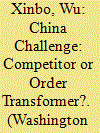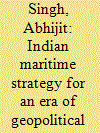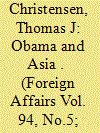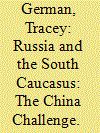| Srl | Item |
| 1 |
ID:
174623


|
|
|
|
|
| Summary/Abstract |
There is no question that the sudden outbreak of the coronavirus and the heavy causalities it has brought to the United States have led to an unhealthy and even dangerous path toward heightened antagonism in Sino-US relations. The friction between Beijing and Washington over COVID-19, however, may have also overshadowed some more fundamental elements underlying their interactions that will continue to shape bilateral ties and even international systemic mega-trends, long after the current crisis. In fact, the ongoing discourse on the implications of the pandemic has already raised questions about how it may affect strategic competition, a potential power shift between the United States and China, and even international order in general. It is, therefore, highly important to have a sober and systemic assessment of the drivers and momentums that have been molding US-China relations to understand the relationship’s future, during and after the COVID-19 crisis.
|
|
|
|
|
|
|
|
|
|
|
|
|
|
|
|
| 2 |
ID:
186883


|
|
|
| 3 |
ID:
140955


|
|
|
|
|
| Summary/Abstract |
The fractious nature of maritime relations in the Asia-Pacific region is a recognisable feature of international geopolitics today. Following China’s massive reclamation and ‘island-building’ project in the South China Sea recently, many Pacific states have moved to bolster their maritime postures. While Japan has sought legislative amendments to liberate its maritime posture from post-war passivism, Vietnam and the Philippines have been building stronger navies aimed at countering China’s hostile moves in the South China Sea. Meanwhile, Indonesia has sought to renew its capabilities as a maritime power through a new ‘maritime axis’ strategy, while Australia has boldly advocated an ‘Indo-Pacific’ framework for joint security endeavours and the creation of ‘middle-power coalitions’. In the interim, Russia has updated its maritime doctrine, announcing its military partnership with China as the cornerstone of its naval strategy in the Pacific.
|
|
|
|
|
|
|
|
|
|
|
|
|
|
|
|
| 4 |
ID:
140526


|
|
|
|
|
| Summary/Abstract |
China’s rise poses two broad challenges for U.S. foreign policy: how to deter the People’s Republic from destabilizing East Asia and how to encourage it to contribute to multilateral global governance. Although China is not yet a military peer competitor of the United States, it has become powerful enough to challenge U.S. friends and allies in East Asia and to pose serious problems for U.S. forces operating there. And although China is still a developing country with significant domestic problems, it has become an important enough actor that its cooperation is necessary to solve global problems such as nuclear proliferation, climate change, and international financial instability.
|
|
|
|
|
|
|
|
|
|
|
|
|
|
|
|
| 5 |
ID:
167321


|
|
|
|
|
| Summary/Abstract |
In spite of fiscal pressure at home and China’s continued rise abroad, the United States shows no signs of reversing its costly grand strategy of deep engagement. In the context of America’s relative decline, we evaluate existing proposals to ease pressure on the United States. We argue that the key aspects of American decline are often operational rather than strategic in nature; consequently that the undifferentiated fashion in which rise and decline is often presented is not useful in describing current changes or in proposing how to address them. Problems at the operational level do not necessarily demand higher-level strategic level alterations. As such, although restructured forms of deep engagement will help alleviate resource constraints in the medium to long term, their utility in addressing the operational changes wrought by relative decline are less apparent. Given that resource constraints are not necessarily the primary concern, therefore, the major strategic elements of American deep engagement are more durable than commonly supposed. America’s current strategic objectives are not constrained by changes by virtue of its relative material decline with respect to China but by changes in the operational environment.
|
|
|
|
|
|
|
|
|
|
|
|
|
|
|
|
| 6 |
ID:
188297


|
|
|
|
|
| Summary/Abstract |
Russia has sought to maintain its influence in the South Caucasus by a variety of means, viewing the region as an area of crucial importance for its core strategic interests. However, China’s prominence in the South Caucasus has increased significantly over the past decade, as the South Caucasus states seek to diversify their diplomatic and economic ties. This essay explores whether Russia’s regional hegemony in the South Caucasus is being challenged by China: does China’s growing engagement with the states of the South Caucasus pose a challenge to Russian influence within its traditional zone of ‘privileged interest’?
|
|
|
|
|
|
|
|
|
|
|
|
|
|
|
|